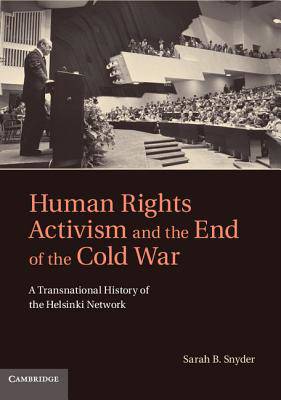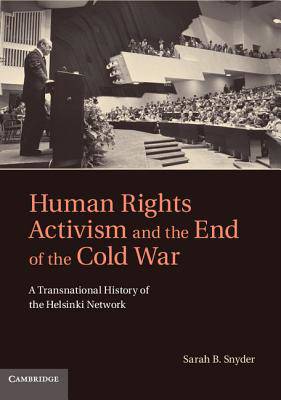
- Afhalen na 1 uur in een winkel met voorraad
- Gratis thuislevering in België vanaf € 30
- Ruim aanbod met 7 miljoen producten
- Afhalen na 1 uur in een winkel met voorraad
- Gratis thuislevering in België vanaf € 30
- Ruim aanbod met 7 miljoen producten
Zoeken
Human Rights Activism and the End of the Cold War
A Transnational History of the Helsinki Network
Sarah B Snyder
€ 93,95
+ 187 punten
Uitvoering
Omschrijving
Two of the most pressing questions facing international historians today are how and why the Cold War ended. Human Rights Activism and the End of the Cold War explores how, in the aftermath of the signing of the Helsinki Final Act in 1975, a transnational network of activists committed to human rights in the Soviet Union and Eastern Europe made the topic a central element in East-West diplomacy. As a result, human rights eventually became an important element of Cold War diplomacy and a central component of détente. Sarah B. Snyder demonstrates how this network influenced both Western and Eastern governments to pursue policies that fostered the rise of organized dissent in Eastern Europe, freedom of movement for East Germans, and improved human rights practices in the Soviet Union - all factors in the end of the Cold War.
Specificaties
Betrokkenen
- Auteur(s):
- Uitgeverij:
Inhoud
- Aantal bladzijden:
- 304
- Taal:
- Engels
- Reeks:
Eigenschappen
- Productcode (EAN):
- 9781107001053
- Verschijningsdatum:
- 20/06/2011
- Uitvoering:
- Hardcover
- Formaat:
- Ongenaaid / garenloos gebonden
- Afmetingen:
- 155 mm x 231 mm
- Gewicht:
- 544 g

Alleen bij Standaard Boekhandel
+ 187 punten op je klantenkaart van Standaard Boekhandel
Beoordelingen
We publiceren alleen reviews die voldoen aan de voorwaarden voor reviews. Bekijk onze voorwaarden voor reviews.











